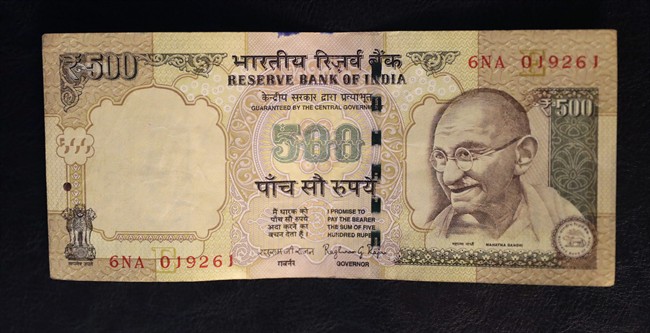Delivering one of India‘s biggest-ever economic upsets, Prime Minister Narendra Modi this week declared the bulk of Indian currency notes no longer held any value and told anyone holding those bills to take them to banks.

Only those holding huge stashes of untaxed “black money” need worry, Modi said.
About 80 per cent of India’s financial transactions are conducted in cash, often to evade taxes. While some of that activity is illegal, hundreds of millions of rural poor, scrappy entrepreneurs and small-time traders also keep their savings in cash, sometimes just because there is no bank branch nearby.
READ MORE: Trudeau set to visit India following invite from Modi
India’s industry leaders, bankers and market analysts rallied behind Modi’s move, viewing it as a much-needed corrective in a cash-reliant culture that has facilitated corruption. Within hours of Modi’s announcement that all 500- and 1,000-rupee notes – worth about $7.50 and $15 – would hold no value as of Wednesday, the hashtag “ModiFightsCorruption” began trending on Twitter.
In the short term, economic activity is slowing until enough new notes worth 500 and 2,000 rupees are printed and put into circulation, analysts said. Some bank branches opened Thursday and began passing out the new 2,000 rupee notes in exchange for old bills, with a daily 4,000-rupee limit for each person.
WATCH: ‘Uncertain times ahead’ for economy as Indian stock market plummets in wake of Brexit vote

Those branches heaved with people anxious to make an exchange; other bank branches and ATMs were still closed.
“There is a huge shortage. We don’t have any small denomination bills. My pockets are empty and so is my home,” said Moinudeen, a 36-year-old private company employee who goes by one name, after exchanging some bills at the bank. “If you go to buy milk, the milkman is not accepting money. At petrol pumps, they are not fueling for less than 500 rupees.”
Even citizens who supported the currency overhaul bemoaned the inconvenience.
READ MORE: Wynne prepares for India trade trip: ‘The year of Canada and India’
If Modi “had planned this better, it would have been better,” said Sushil Sachdeva, who worried about getting to the home of his 84-year-old father. “I only have two bills of 100 rupees in my pocket. Tell me what should I do? How can I go? How will I pay the bus fare? I am very troubled.”
Analysts also predicted a rush on gold, foreign currency and other forms of wealth. But the financial sector overwhelmingly said it was worth it.
“The eradication of the black money menace from the Indian economy is a big positive in the long-term, and the Indian economy will be on a very strong footing once the short-term teething problems are done,” said Sachin Shah, fund manager at the Mumbai-based Emkay Global Financial Services.
Morgan Stanley hailed the demonetization as a “bold move to curb black money” that would bring millions more Indians into the tax regime. As of now, only about 1.6 per cent of India’s 1.25 billion people pay income tax.
READ MORE: Protesters greet Indian PM Narendra Modi as he visits Vancouver, Surrey
Not everyone is on board.
“Will it put an end to black money? Hardly. People with large amounts of black money will convert it into gold and foreign currency,” the newspaper Economic Times said in an editorial Wednesday.
Citigroup warned that scrapping so much currency would spur short-term market volatility, though it said it does “expect longer-term positives for equities.” Indian share prices tumbled on Wednesday before recovering some ground, but it was hard to tell how much came from the Modi currency shock and how much was due in reaction to Donald Trump winning the U.S. presidential election.
Former Finance Minister Palaniappan Chidambaram, of the opposition Congress party, warned that poor farmers, workers and small traders would be hit hard. He urged the government to swap in the new bills quickly.
READ MORE: 70 arrested in India for targeting Americans in multimillion-dollar tax scam
“The government and the banks will be on test on how well they handle the implementation of the decision,” Chidambaram told reporters Wednesday.
The immensity and suddenness of Modi’s currency overhaul took the country by surprise, though he has been seeking to eliminate black money since taking office in 2014 by launching a government scheme to open bank accounts for all citizens and granting wealthy Indians a tax amnesty for disclosing undeclared assets and cash holdings.
The one-time amnesty raised only around $10 billion – far less than what the government expected.
READ MORE: Canada’s underground economy is thriving. So are you contributing?
Modi said in his televised address Tuesday night that authorities had discovered 1.25 trillion rupees, or about $18.8 billion, in illegal cash over the last two and a half years. The only way to reclaim such sums would be to do it without warning, to prevent tax dodgers from converting illegal cash holdings, he said.
With no other options, some of those rushing to banks on Thursday tried to be philosophical.
“For anything to take effect, you have to wait for a few days,” said 32-year-old insurance worker Rajesh, who declined to give his last name. “Maybe this will be a good move.”



Comments